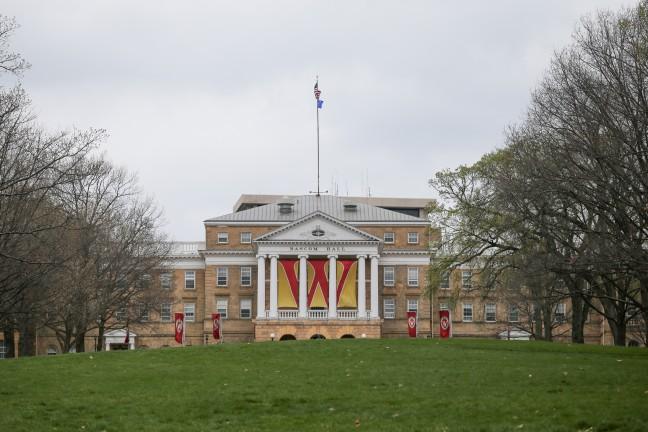Had the Gulf oil spill exploded in Lake Mendota instead of the Gulf of Mexico, the oil would have not only ravaged the city of Madison, but Eau Claire, La Crosse and Minnesota’s border, according to National Oceanic and Atmospheric Administration data.
From Madison and even Wisconsin, the scale and gravity of the disaster is not nearly as profound as it is for those whose lives are affected by the poison washing up on shore and destroying wetland habitats.
Despite the distance that separates Badgers from the tainted shores, there are some at the University of Wisconsin who have played integral parts in the aftermath of the spill and others who are linked to the oil company responsible for it, British Petroleum.
BP on campus
The oil company does play a role on the UW campus and has even helped the UW Geoscience Department with some of their research. BP has donated expensive 3D seismic imaging technology to the department — technology, UW Geoscience Professor Alan Carroll said, the department would not have been able to get on their own.
However, Carroll said BP does not attach strings to their donations.
“Overall, BP’s interaction has been responsible and non-interfering,” Carroll said.
BP also funds Research Assistant programs for UW students. Although BP has no role in selecting the students who receive the positions, the financial support does mean BP has a link to recruiting students at UW, Carroll said. The students in the RA positions can conduct their research on anything they choose.
BP has been recruiting students at UW since 1998 and has hired 20 UW graduates, Carroll said in an email to The Badger Herald.
BP is not the exclusive benefactor oil company to make donations to UW. Carroll said ExxonMobil has donated similar technology and UW Geoscience Professor Harold Tobin said Landmark, a subsidiary of Halliburton, has also made donations to further the department’s research.
Carroll said UW would continue to maintain its relationship with BP, as it is a “great deal” for the university.
Meanwhile, other UW faculty have been helping keep the oil giant accountable in the days following the disaster.
A Badger’s research in action
UW Sea Grant Institute Director Anders Andren was approached by NOAA during the early stages of the oil spill in May to use government data to make estimates on how much oil was actually leaking into the ocean daily.
UW Sea Grant Institute spokesperson Moira Harrington said Andren’s estimates, using the NOAA data, were much larger than the estimates BP was giving the government at the same time.
Andren’s estimates were later proven more accurate, Harrington said. The United States government had previously been relying on the oil company’s estimates for how much oil was gushing into the Gulf Coast.
He has since been consulted during more confidential NOAA briefings on clean-up efforts and potential solutions to the oil spill.
Oil-munching bacteria is the focus of current research funded by the UW Sea Grant Institute. Andren said the institute has researchers on the Gulf Coast beaches studying which bacteria can naturally metabolize the oil washed upon the shore.
Although the bacteria could offer the beaches some relief, Andren said the environmental, social and economic impacts, great as they are now, will take some time to be fully realized.
“The economic impact is just tremendous,” Andren said.
According to Andren, one third of the United States fishing harvest comes from the Gulf. One third of the Gulf currently has a fishing ban. Another area of concern is the degradation of the wetland habitat, which was already eroding before the spill at a rate of 20,000 acres a year.
UW expert’s ‘oil spill’ outlook
UW Co-Director of the Business, Environment and Social Responsibility Program Thomas Eggert will scoff at the phrase “oil spill.” His view of the disaster is less than optimistic, but he first lays down a little BP history.
Before current BP CEO Tony Hayward there was John Brown, who according to Eggert, carved out a “green” niche in BP. This niche included solar power and other alternative fuel sources, as well as the new green and yellow sunburst logo, which has since been used in a Greenpeace contest as a centerpiece to illustrate the spill’s destruction.
When Brown retired, Eggert said environmental consequences and efforts took a backseat to short term saving measures, including cut backs on safety.
“But then you end up blowing up an oil rig,” Eggert sighed.
Eggert said he was more encouraged about the progress made to help the people living with the oil spill than the clean-up efforts. BP’s $20 billion fund, which will not be managed by them, will go to the people with claims about damage they have incurred because of the spill.
Even with the fund, Eggert said the healing on the coast has not yet started.
“Why would we as a public be reassured? Can we [be] encouraged from an environmental perspective? I would say no,” Eggert said.
Stagnant student movement
If there has been any student movement on campus to aid the oil spill, it has been very quiet and very tepid. The timing of the oil spill may account for this.
April 20 marks the first day of the oil spill, and also the time when students at UW begin biting their nails about exams and making summer plans. Usually active student organizations disperse for a much-needed break, but that does not mean the oil stops gushing.
The Center for Leadership and Involvement also said they did not know of any current projects or fundraisers.
Associated Students of Madison Chair Brandon Williams added ASM was not currently working on any aid efforts. The Morgridge Center does not have any current projects either.
“I believe because of the timing of the BP oil spill, the Greek Community hasn’t had an opportunity to respond to this devastating environmental disaster. Greek chapters will resume their community service and philanthropic work once the school year begins,” Coordinator of Greek Life and Involvement Barb Kautz said in an e-mail to The Badger Herald.
The lack of response is unusual for the UW campus. Last semester, the Associated Students of Madison held a UW Day of Action to aid the victims of the earthquake in Haiti, raising approximately $7,000, and the Alpha Epsilon Pi’s Chili for Chile fundraiser brought in $650 for the earthquake relief effort.
The campus provided aid without leaving home.
WISPIRG Chair Rashi Mangalick said her group is planning one such event to raise awareness during the school year — a global warming campaign, where the focus will be the oil spill, and better practices for finding oil and other sources of energy.
“[We] want to make sure BP is held accountable. [The oil spill] has been so detrimental to all our environmental resources,” Mangalick said.
‘It’s already a madhouse’
A general understanding and awareness of the environmental effects of the oil on the shores and wetlands, as well as the social and economic effects, are important for the Midwest, Wisconsin and UW to help with the Gulf Coast, Andren said. That awareness can be just as important as heading to the coast to clean wildlife and lay booms.
However, Andren said students should think twice before packing their bags for Louisiana. Once the oil reaches the surface, some of it evaporates into the air, adding an acrid, toxic smell to the clean-up process.
“It is already a madhouse down there, quite frankly. Can you imagine the logistical nightmare of coordinating people speaking all different languages laying booms? Being out there on the ship is like having your nose in a gas tank,” Andren said of some of current efforts in the Gulf Coast.
Those who do feel the itch to help with a more hands-on approach in the Gulf be warned — in the wake of the oil spill, scammers have taken advantage of would-be volunteers’ philanthropy, according to a statement from the Wisconsin Department of Agriculture, Trade and Consumer Protection.
The statement said scammers pose as BP agents or other legitimate employers asking for personal and financial information in return for guaranteed job placement working on the coast. Anyone looking for volunteer or job opportunities should contact the Deepwater Horizon Response.
Your local pump
One thing that will not help solve the spill is boycotting local BP gas stations, UW Marketing Professor Thomas O’Guinn said.
“I do not know [if BP can get their pre-spill public image back]. I kind of doubt it. But I do not know if that matters,” O’Guinn said.
What does matter, he said, is their corporate image in the eyes of Congress and state legislators. If their constituents begin to feel negatively about deep-water oil drilling, it could mean stricter regulations for the oil companies. It will be harder to save their image in the eyes of their regulators.
“That’s what BP is worried about. And they should be,” O’Guinn said.
Although the Midwest does not wake up to the smell of oil in the air every morning, it does not mean the spill will not affect it.
The corporation responsible for the oil spill funds facets of research at UW, Wisconsin experts are turned to for council on oil spill data and the ways one can help start the healing on the Gulf Coast are many.
Had the Gulf oil spill exploded in Lake Mendota instead of the Gulf of Mexico, the oil would have not only ravaged the city of Madison, but Eau Claire, La Crosse and Minnesota’s border, according to National Oceanic and Atmospheric Administration data.
From Madison and even Wisconsin, the scale and gravity of the disaster is not nearly as profound as it is for those whose lives are affected by the poison washing up on shore and destroying wetland habitats.
Despite the distance that separates Badgers from the tainted shores, there are some at the University of Wisconsin who have played integral parts in the aftermath of the spill and others who are linked to the oil company responsible for it, British Petroleum.













